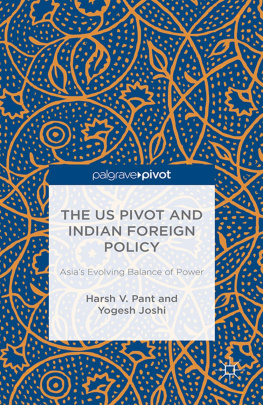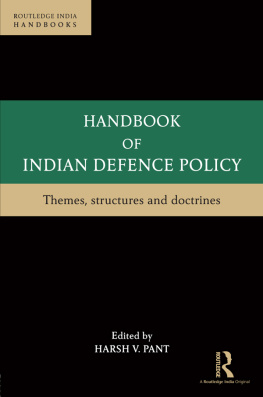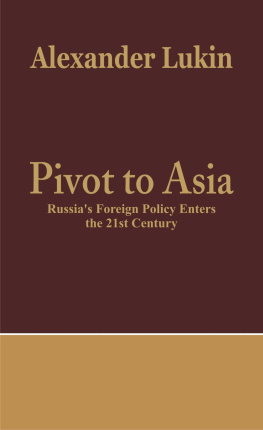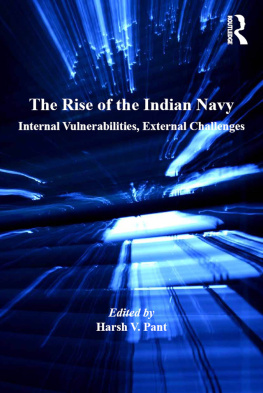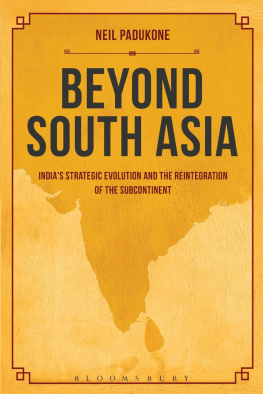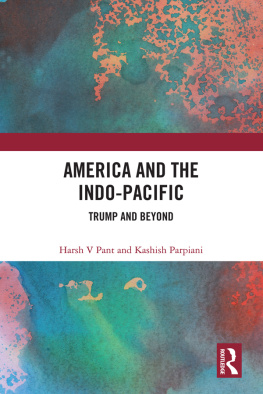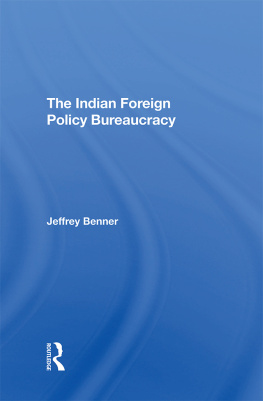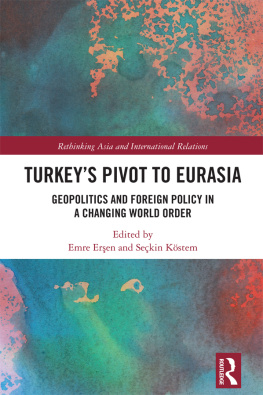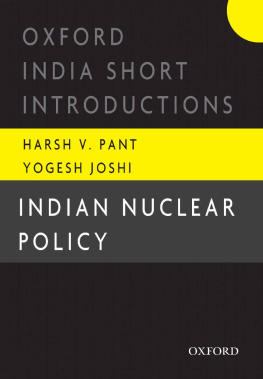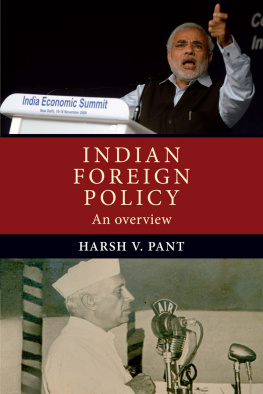Harsh V. Pant - The US Pivot and Indian Foreign Policy Asia’s Evolving Balance of Power
Here you can read online Harsh V. Pant - The US Pivot and Indian Foreign Policy Asia’s Evolving Balance of Power full text of the book (entire story) in english for free. Download pdf and epub, get meaning, cover and reviews about this ebook. year: 2015, genre: Politics. Description of the work, (preface) as well as reviews are available. Best literature library LitArk.com created for fans of good reading and offers a wide selection of genres:
Romance novel
Science fiction
Adventure
Detective
Science
History
Home and family
Prose
Art
Politics
Computer
Non-fiction
Religion
Business
Children
Humor
Choose a favorite category and find really read worthwhile books. Enjoy immersion in the world of imagination, feel the emotions of the characters or learn something new for yourself, make an fascinating discovery.
- Book:The US Pivot and Indian Foreign Policy Asia’s Evolving Balance of Power
- Author:
- Genre:
- Year:2015
- Rating:4 / 5
- Favourites:Add to favourites
- Your mark:
- 80
- 1
- 2
- 3
- 4
- 5
The US Pivot and Indian Foreign Policy Asia’s Evolving Balance of Power: summary, description and annotation
We offer to read an annotation, description, summary or preface (depends on what the author of the book "The US Pivot and Indian Foreign Policy Asia’s Evolving Balance of Power" wrote himself). If you haven't found the necessary information about the book — write in the comments, we will try to find it.
The US Pivot and Indian Foreign Policy Asia’s Evolving Balance of Power — read online for free the complete book (whole text) full work
Below is the text of the book, divided by pages. System saving the place of the last page read, allows you to conveniently read the book "The US Pivot and Indian Foreign Policy Asia’s Evolving Balance of Power" online for free, without having to search again every time where you left off. Put a bookmark, and you can go to the page where you finished reading at any time.
Font size:
Interval:
Bookmark:

The US Pivot and Indian Foreign Policy DOI: 10.1057/9781137557728.0001
Other Palgrave Pivot titles Alan Bainbridge: On Becoming an Education Professional: A Psychosocial Exploration ofDeveloping an Educational Professional Practice Bruce Moghtader: Foucault and Educational Ethics John K. Roth and Carol Rittner: Teaching About Rape in War and Genocide Robert H. Blank: Cognitive Enhancement: Social and Public Policy Issues Cathy Hannabach: Blood Cultures: Medicine, Media, and Militarisms Adam Bennett, G. Russell Kincaid, Peter Sanfey, and Max Watson: Economic and PolicyFoundations for Growth in South East Europe: Remaking the Balkan Economy Shaun May: Rethinking Practice as Research and the Cognitive Turn Eoin Price: Public and Private Playhouses in Renaissance England: The Politics ofPublication
David Elliott: Green Energy Futures: A Big Change for the Good Susan Nance: Animal Modernity: Jumbo the Elephant and the Human Dilemma Alessandra Perri: Innovation and the Multinational Firm: Perspectives on ForeignSubsidiaries and Host Locations
Heather Dubrow: Spatial Deixis in the Early Modern English Lyric: Unsettling SpatialAnchors Like Here, This, Come
Felicity Callard and Des Fitzgerald: Rethinking Interdisciplinarity across the SocialSciences and Neurosciences
Catrin Norrby and Camilla Wide: Address Practice AS Social Action: EuropeanPerspectives
Alastair Ager and Joey Ager: Faith, Secularism, and Humanitarian Engagement: Findingthe Place of Religion in the Support of Displaced Communities yvind Kvalnes: Moral Reasoning at Work Neema Parvini: Shakespeare and Cognition: Thinking Fast and Slow through Character Rimi Khan: Art in Community: The Provisional Citizen Amr Yossef and Joseph R. Cerami: The Arab Spring and the Geopolitics of the MiddleEast: Emerging Security Threats and Revolutionary Change Sandra L. Enos: Service-Learning and Social Entrepreneurship in Higher Education: APedagogy of Social Change
Fiona M. Hollands and Devayani Tirthali: MOOCs in Higher Education: InstitutionalGoals and Paths Forward
Geeta Nair: Gendered Impact of Globalization of Higher Education: Promoting HumanDevelopment in India
DOI: 10.1057/9781137557728.0001

The US Pivot and
Indian Foreign Policy:
Asias Evolving Balance
of Power
Harsh V. Pant
Kings College London, UK
and
Yogesh Joshi
Jawaharlal Nehru University, India
DOI: 10.1057/9781137557728.0001

Harsh V. Pant and Yogesh Joshi 2016
Softcover reprint of the hardcover 1st edition 2016 978-1-137-55771-1
All rights reserved. No reproduction, copy or transmission of this publication may be made without written permission.
No portion of this publication may be reproduced, copied or transmitted save with written permission or in accordance with the provisions of the Copyright, Designs and Patents Act 1988, or under the terms of any licence permitting limited copying issued by the Copyright Licensing Agency, Saff ron House, 610 Kirby Street, London EC1N 8TS.
Any person who does any unauthorized act in relation to this publication may be liable to criminal prosecution and civil claims for damages.
Th
e authors have asserted their rights to be identifi ed as the authors of this work in accordance with the Copyright, Designs and Patents Act 1988.
First published 2016 by
PALGRAVE MACMILLAN
Palgrave Macmillan in the UK is an imprint of Macmillan Publishers Limited, registered in England, company number 785998, of Houndmills, Basingstoke, Hampshire RG21 6XS.
Palgrave Macmillan in the US is a division of St Martins Press LLC, 175 Fift h Avenue, New York, NY 10010.
Palgrave Macmillan is the global academic imprint of the above companies and has companies and representatives throughout the world.
Palgrave and Macmillan are registered trademarks in the United States, the United Kingdom, Europe and other countries.
ISBN: 978-1-137-55772-8 PDF
ISBN: 978-1-349-71844-3
A catalogue record for this book is available from the British Library.
A catalog record for this book is available from the Library of Congress.
www.palgrave.com/pivot
DOI: 10.1057/9781137557728
To
The Indomitable Spirit of Kumaon
DOI: 10.1057/9781137557728.0001
Contents
Preface vii
Introduction
2 Power Transition in Asia and IndianForeign Policy
3 Indo-US Ties in the Age of Pivot
Indias China Challenge
The Indo-Japanese Strategic Partnershipand Power Transition in Asia
6 India and Regional Balance of Powerin Asia
Conclusion
Bibliography 128
Index 148
vi
DOI: 10.1057/9781137557728.0001
Preface
Facing an assertive China in the Asia-Pacific, US
President Barack Obama announced in late 2011 his strategy of pivoting toward the region. India has emerged as an important constituent of this new policy framework, which is aimed at balancing Chinas growing power. For India, too, Chinas growing military and economic prowess poses a strategic challenge. Yet rather than endorse the pivot, Indian foreign policy shows signs of pursuing a hedging strategy in three distinct realms.
First, New Delhi is recalibrating its strategic ties with the US. Second, rather than balancing China through external help, New Delhi has been trying to normalize its relationship with Beijing without much apparent success. Third, India is encouraging a more localized form of balancing by increasing its defense partnerships with other regional powers. This book examines Indias foreign policy response to the US pivot toward Asia and investigates New Delhis strategy for dealing with the changing balance of power in the region.
This book came out of an Economic and Social Science Research Council grant that enabled us to pursue this collaborative research project. Thanks to the Department of Defence Studies at Kings College London and Jawaharlal Nehru University for allowing us to take this project forward. Hannah Kaspar at Palgrave Macmillan remained patient even as we missed a few deadlines but her support for us did not waiver. Special thanks to Kundan Singh who provided critical last-minute assistance to us which was badly needed. We would like to express our gratitude to DOI: 10.1057/9781137557728.0002
vii
viii
Preface
the numerous policymakers, thinkers and defense officials, both in India and the US, who took time off to talk to us and shared their valuable insights. Last, but not the least, both of us would like to thank our fami-lies who have continued to support us through our academic journeys.
We dedicate this book to the hills and people of Kumaon, a region in India where both of us come from and which we treasure deeply.
DOI: 10.1057/9781137557728.0002
Introduction
Abstract:Tra
T nsition of
o power in
r
inter
Next pageFont size:
Interval:
Bookmark:
Similar books «The US Pivot and Indian Foreign Policy Asia’s Evolving Balance of Power»
Look at similar books to The US Pivot and Indian Foreign Policy Asia’s Evolving Balance of Power. We have selected literature similar in name and meaning in the hope of providing readers with more options to find new, interesting, not yet read works.
Discussion, reviews of the book The US Pivot and Indian Foreign Policy Asia’s Evolving Balance of Power and just readers' own opinions. Leave your comments, write what you think about the work, its meaning or the main characters. Specify what exactly you liked and what you didn't like, and why you think so.

